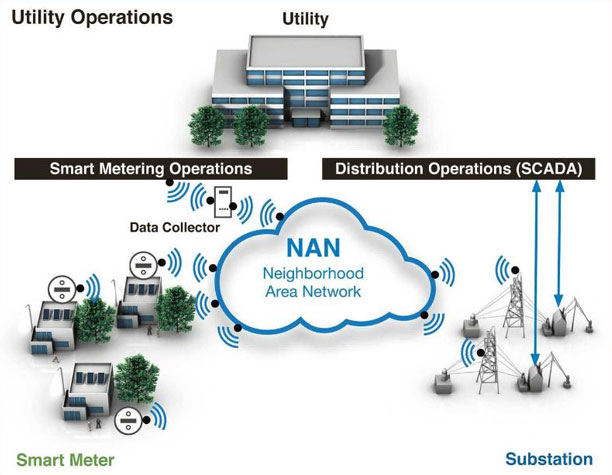ZigBee Wants To Standardize Smart Grid Neighborhood Area Networks (NAN)
ZigBee Alliance has announced that a number of his members are working of developing a standard for the NAN. NAN is defined as a utility's last-mile, outdoor access network that connects smart meters and other utility devices to Wide Area Network (WAN) communication points. ZigBee pointed out that an important of the NAN standardization is to help seamless interoperability between utilities and product manufacturers.

“Today the ZigBee Alliance, a global ecosystem of organizations creating wireless solutions for use in energy management, commercial and consumer applications, announced that a group of leading smart metering and smart grid member companies are developing a communication profile aimed at achieving true plug-and-play interoperability between the members' wireless smart grid Neighborhood Area Network (NAN) products and solutions. The NAN is defined as a utility's last-mile, outdoor access network that connects smart meters and distribution automation devices to Wide Area Network (WAN) gateways such as RF collectors or data concentrators and field devices.
There is a global requirement from regulators and utilities for standards-based interoperable NANs. Open global standards provide utilities with wider choice of product features, increased price competition, reduced supply risk and flexibility in selecting vendors all while assuring that products will interoperate seamlessly. Existing IEEE and IETF standards on their own do not ensure interoperability due to the many options available within the standards. The NAN specification will fill the gap by selecting the most appropriate options between standards and defining a communication profile with certifiable interoperability. This will be a significant improvement for utilities when compared with the non-interoperable, proprietary single-vendor solutions available today.
In order to ensure interoperability, a full wireless communications protocol is being defined for Layers 1 through 4 of the ISO OSI communication stack. This provides a harmonized transport network supporting different IP-based applications. Layers 1 and 2 will be based on the IEEE 802.15.4g amendment to the IEEE 802.15.4 (2011) standard that was introduced to enable the development of interoperable NANs. Layers 3 and 4 will be based on IEFT standards including the IPv6 network layer and associated networking schemes, appropriate routing and transport protocols (e.g., RPL, UDP and TCP) and relevant security mechanisms. This wireless communications profile will enable interoperability between different vendors who have all implemented their smart meters, smart grid devices and communication infrastructure node products according to the certifiable NAN communications profile. Today's existing smart grid applications such as smart metering and distribution automation will run on top of this interoperable wireless IPv6 communications profile.
A key aspect of this NAN standardization work is to establish a test and certification program supported by independent test houses with the aim of certifying the interoperability of different manufacturers' smart grid products and solutions. The ZigBee Alliance will maintain a register of certified smart meter and smart grid products in order to provide confidence for utility customers when making their smart grid vendor selections. The ZigBee Alliance already has a great deal of experience in successfully managing test and certification programs for other application areas such as Smart Energy.
"Our Alliance contains an impressive collection of the world's leading smart metering and smart grid solution experts, along with the leading silicon and communication protocol specialists," said Bill Lichtensteiger, Director of Communication Technology at Landis + Gyr. "When you combine this expertise with our Alliance's experience and ever-increasing focus on testing and certification of interoperable communication profiles, it results in a valuable set of standards for our utility customers and vendors. As well as ensuring interoperability between products from different vendors, these standards will help to increase performance and reliability, reduce risk and increase flexibility."
To date, the definition and documentation of the market requirements and the detailed technical requirements for the NAN has been completed. A number of 'proof of concept' events to test the interoperability of the PHY/MAC functions that will be included in the NAN standard have been held during the past year involving companies from around the world. All participants' NAN products were able to communicate with each other through the PHY/MAC layers. In addition, several companies demonstrated interoperability for basic IP functions. The NAN standardization work is anticipated to be completed by the end of 2014 and will also include the Technical Specification, Protocol Implementation Conformance Statement (PICS) and Certification Test Plan.
"The ZigBee Alliance has a long history of developing interoperable wireless communication standards based on open international IEEE 802.15.4 and IETF standards, which have been adopted worldwide in numerous applications," said Tobin J.M. Richardson, President & CEO of the ZigBee Alliance. "We welcome this new initiative which was started by our smart grid member companies and look forward to extending our activities by helping utilities to achieve interoperability in their NANs."
source: ZigBee